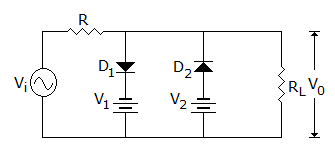Question

a.
vi is more than V1
b.
vi is less than V1
c.
vi is between V1 and V2
d.
none of the above
Posted under Electronics and Communication Engineering
Interact with the Community - Share Your Thoughts
Uncertain About the Answer? Seek Clarification Here.
Understand the Explanation? Include it Here.
Q. In figure, D1 turns on when
Similar Questions
Explore Relevant Multiple Choice Questions (MCQs)
Q. In the circuit of figure both diodes are ideal. If v1 = 10 V and v2 = 10 V which diode will conduct?
View solution
Q. In the circuit of the given figure, assume that the diodes are ideal and the meter is an average indicating ammeter, the ammeter will read
View solution
Q. In the following figure C = 0.02 μF, and Vth is known to be of frequency ω = 10⁷ rad/sec and rd = 2.5 Ω and ZTh = RTh = 10 Ω Then phase angle between id and Vd
View solution
Q. In figure the cut in voltage of diode is 0.7 V and its bulk resistance is 20 Ω. The peak value of circuit current of during positive and negative half cycles are
View solution
Q. In figure, VG =
View solution
Q. In figure the voltage drop across diode is 0.7 V. Then the voltage across diode during negative half cycle is
View solution
Q. In figure vi = 10 mV dc maximum. The maximum possible dc output offset voltage is
View solution
Q. For the circuit of figure the critical frequency is
View solution
Q. The current through R1 is(If β = 99, VBE = 0.74 V)
View solution
Q. The feedback technique employed in the following circuit is
View solution
Q. In figure the approximate voltages of
View solution
Q. Which one of the following is connect expression of id for figure?
View solution
Q. In figure the current through resistor R
View solution
Q. For an npn transistor connected as shown in the figure VBE = 0.7 volts. Given that reverse saturation current of the junction at room temperature 300K is 10¯¹³A, the emitter current.
View solution
Q. The dc output voltage of the circuit is
View solution
Q. In figure we need an ac ground. The proper value of C is
View solution
Q. For the circuit in figure the output wave shape is
View solution
Q. In figure V0 =
View solution
Q. In figure, ID = 4 mA. Then VS =
View solution
Q. The circuit shown is
View solution
Recommended Subjects
Are you eager to expand your knowledge beyond Electronics and Communication Engineering? We've handpicked a range of related categories that you might find intriguing.
Click on the categories below to discover a wealth of MCQs and enrich your understanding of various subjects. Happy exploring!








